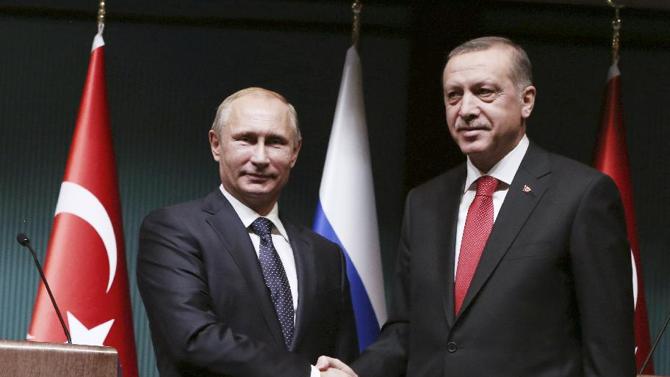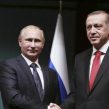
Russian Energy Proposals for Turkey Could Undermine Southern Gas Corridor
Publication: Eurasia Daily Monitor Volume: 11 Issue: 225
By:

As 2014 draws to a close, energy developments in the Eurasian region have been gaining new prominence. Notably, on December 1, Russian President Vladimir Putin paid a state visit to Turkey to attend the fifth meeting of the Turkish-Russian High-Level Cooperation Council (CNN Turk, December 1). During this meeting, the parties talked about speeding up construction of the Akkuyu nuclear power plant. Additionally, both sides agreed that Turkey’s energy imports from Russia via the Blue Stream natural gas pipeline would increase from 16 billion to 19 billion cubic meters per year.
While in Ankara, Putin held individual talks with Turkish President Recep Tayyip Erdogan and Turkish Prime Minister Ahmet Davutoglu. The leaders discussed a range of topics, including the development of bilateral economic relations and regional cooperation. The increasingly interdependent nature of Russia’s economic relations with Turkey, along with Moscow’s wish to divert its energy export routes to Eastern Europe away from the Ukrainian pipeline network to Turkey, have enhanced Ankara and Moscow’s mutual importance to one another. The total volume of Russian direct investment in Turkey has now reached $1.7 billion, with Turkish direct investment in Russia nearing $1 billion. And Russian tourism to Turkey has totaled five million tourists this year (Kremlin,ru, November 28). The bilateral Cooperation Council session also agreed to consider further discussions on using the Russian ruble and Turkish lira in bilateral trade, as well as a potential future free trade agreement between Turkey and the Eurasian Customs Union (Russia, Kazakhstan and Belarus).
Perhaps the most widely reported aspect of Putin’s visit to Ankara has been the set of agreements between the two sides regarding Russian natural gas exports to Turkey. In particular, Putin announced that Russia was ending the South Stream gas pipeline project, which would have delivered Russian gas via a route under the Black Sea and then westward into Europe via Bulgaria, completely bypassing Ukraine. Instead, Putin pledged to use the resources previously earmarked for South Stream to build a parallel gas pipeline to the undersea Blue Stream, which already connects Russia and Turkey (A.A. Energy Terminal, December 1). Initially, Russia’s plan involves exporting gas to Europe through Blue Stream 2, then via Turkey and through Greece. In the longer term, Russia and Turkey are considering building an energy terminal in Istanbul to tap into the global markets for oil and gas. This agreement has the potential of increasing Turkey’s role as an energy hub in Europe.
Putin’s visit to Ankara was soon followed, on December 5, by Turkish Prime Minister Davutoglu’s visit to Greece (TRT News, December 5). During his trip to Athens, Davutoglu placed Russia’s energy proposals on the agenda and emphasized the importance of transporting energy resources via Greece. He also highlighted the positive impact of these energy projects on strengthening bilateral cooperation and deepening the relations among the Eastern Mediterranean’s neighbors.
The series of early December visits by the Turkish, Greek and Russian leaders ignited a debate among energy experts as to whether the proposed Blue Stream 2 pipeline would seriously undermine any hopes of one day constructing a trans-Caspian gas pipeline between Turkmenistan and Azerbaijan. Relatedly, various news articles in Azerbaijani media questioned Blue Stream 2’s impact on the future of the Baku-initiated Trans-Anatolian Natural Gas Pipeline (TANAP), which will carry (initially) Azerbaijani gas across Turkey to the borders of the European Union. Together with the South Caucasus Pipeline (stretching across Azerbaijan, Georgia and to Turkey) and the Trans-Adriatic Pipeline (under construction across the southern Balkans into Italy), this transit route for Caspian gas exports has been dubbed the Southern Gas Corridor. A trans-Caspian pipeline, if it is ever built, would further feed the Southern Gas Corridor with Turkmenistan’s massive reserves of natural gas, thus providing an important source and route diversification for Europe, the eastern half of which remains heavily dependent on Russia.
SOCAR (Azerbaijan State Oil Company) President Rovneg Abdullay denied that Blue Stream 2 would have any effect on TANAP’s viability and, hence, on Azerbaijan’s interests (Haqqin.az, December 3). Later, so did Elmar Memmedyarov, Tamar Beruchashvili and Mevlut Cavusoglu, the foreign ministers of Azerbaijan, Georgia and Turkey, respectively, during their Fourth Trilateral Meeting in Kars, (Turkish Ministry of Foreign Affairs, December 10). Nonetheless, the fine print in this matter does not particularly affect TANAP itself, but the possible removal of the need to import Turkmenistani gas, via a trans-Caspian pipeline, to fill TANAP (Azerbaijan’s own reserves are too small in the long term). With extra Russian gas filling Turkey’s pipeline network, Turkmenistan’s gas volumes would potentially be superfluous. More importantly, the delivery of Russian gas to Europe across Blue Stream 2, through TANAP and to Greece (TASS, December 2) would be more cost-efficient than pumping Turkmenistani gas.
According to Turkish energy specialist Muhdan Saglam, another significant, indirect consequence of the sale of Russian gas to Europe via Turkey may be an improvement in transit relations between Turkey and Greece, fueling hopes for possibly reaching an agreement over underwater energy reserves found in the Eastern Mediterranean. Such improvements in bilateral relations not only align with both Turkey’s and Russia’s interests in foreign policy, but could also help strengthen Greece’s role in gas exports to Central Eastern Europe (Anadolu Agency, December 8).
The progress observed in Turkish-Russian relations at the economic level contrasts sharply with both of their positions in the Middle East, especially regarding the civil war in Syria. Turkey and Russia have been unable to demonstrate a shared approach toward this crisis. That said, Putin’s visit to Ankara has also stimulated several steps in the South Caucasus pertaining to overcoming the differences between Turkey and Armenia, and Armenia and Azerbaijan. Notably, pro-government media in Azerbaijan published various articles analyzing the improving relations among Baku, Ankara and Moscow as well suggesting the emergence of this trilateral political axis (Haqqin.az, December 2). Similar statements made by Ibrahim Kalin, the top advisor to Turkish President Erdogan, have not gone unnoticed (Daily Sabah, December 3).
Although the tightening of the Russia-Turkey partnership may not bring substantial change in the short run, over a longer term it could prompt expectations that these improved bilateral relations will positively affect wider regional relations within the South Caucasus. At the same time, the construction of the Blue Stream 2 pipeline may have a positive impact on overcoming outstanding issues between Ankara and Athens, especially those concerning Cyprus and the division of energy resources in the Eastern Mediterranean. Yet, the key question remaining is whether, under the current fast-deteriorating economic conditions, Moscow will be able to complete any of these projects.




